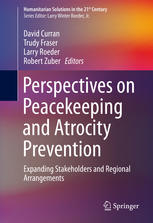

Most ebook files are in PDF format, so you can easily read them using various software such as Foxit Reader or directly on the Google Chrome browser.
Some ebook files are released by publishers in other formats such as .awz, .mobi, .epub, .fb2, etc. You may need to install specific software to read these formats on mobile/PC, such as Calibre.
Please read the tutorial at this link: https://ebookbell.com/faq
We offer FREE conversion to the popular formats you request; however, this may take some time. Therefore, right after payment, please email us, and we will try to provide the service as quickly as possible.
For some exceptional file formats or broken links (if any), please refrain from opening any disputes. Instead, email us first, and we will try to assist within a maximum of 6 hours.
EbookBell Team

0.0
0 reviewsThe current challenges and potential future of peacekeeping in an increasingly complex world take center stage in this far-reaching collection.
Contributors advance a nuanced picture of post-conflict environments across different areas of the globe while considering possible deployments of peacekeeping, traditional military and UN forces in semi-autonomous complementary roles. Longstanding debate topics such as the need for a standing UN army and the field implementation of global right-to-protect concepts are discussed, as are emerging ideas in civilian protection, atrocity prevention and balancing triage operations with long-term peacebuilding efforts. Other dispatches chronicle key issues and concerns regarding peacekeeping operations in Brazil, China and diverse regions of Africa.
Included in the coverage:
Multiple viewpoints, a global scope and real-world clarity make Perspectives on Peacekeeping and Atrocity Prevention an invaluable resource toadvance the work of humanitarians, criminologists and students of and professionals in international relations.
"This collection of articles effectively points to the challenges, complexities and sensitivities of preventing and halting mass atrocity crimes in part through the use of UN peacekeeping operations. The volume also inspires further efforts, including the integration of new and younger stakeholders, to mitigate massive human rights
crimes and fully implement the Responsibility to Protect."Dr. György Tatár
Chair, Budapest Centre for the International Prevention of Genocide and Mass Atrocities
“In a refreshing and engaging manner, this edited volume represents a much-needed contribution to the debate on how best to address current security threats given the limitations and the possibilities of peacekeeping and atrocity prevention. A compelling feature of the book is its exploration of often-neglected stakeholder perspectives alongside first-hand knowledge of the UN system and astute academic observations of key peacekeeping concepts, mandates and practices. Each chapter’s concluding recommendations invite scholars and policy makers to critically interrogate their own beliefs, assumptions and preferred solutions for keeping the peace and preventing mass atrocity violence.”
Dr. Maria Stern
Professor in Peace and Development Studies, School of Global Studies
University of Gothenburg